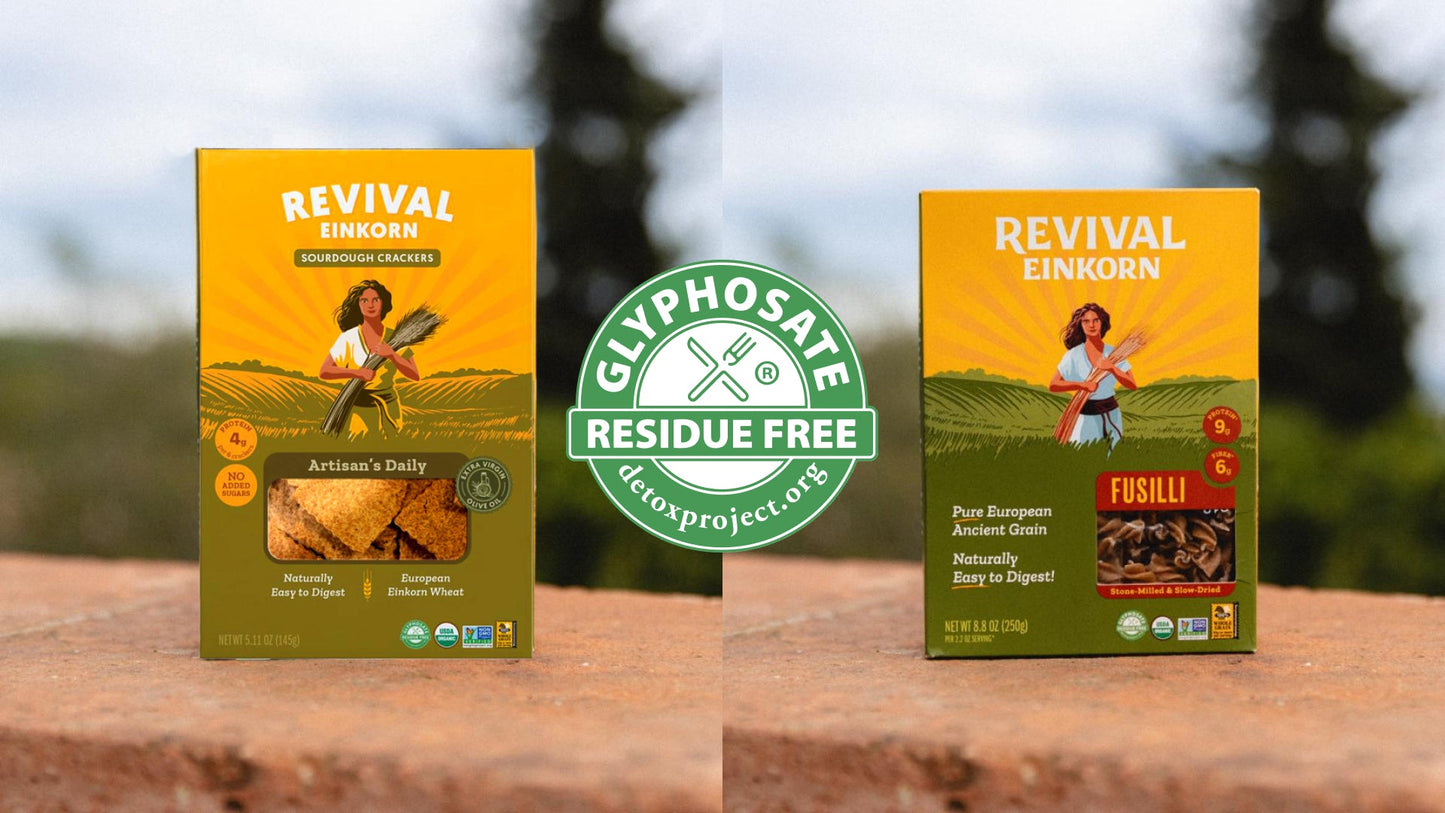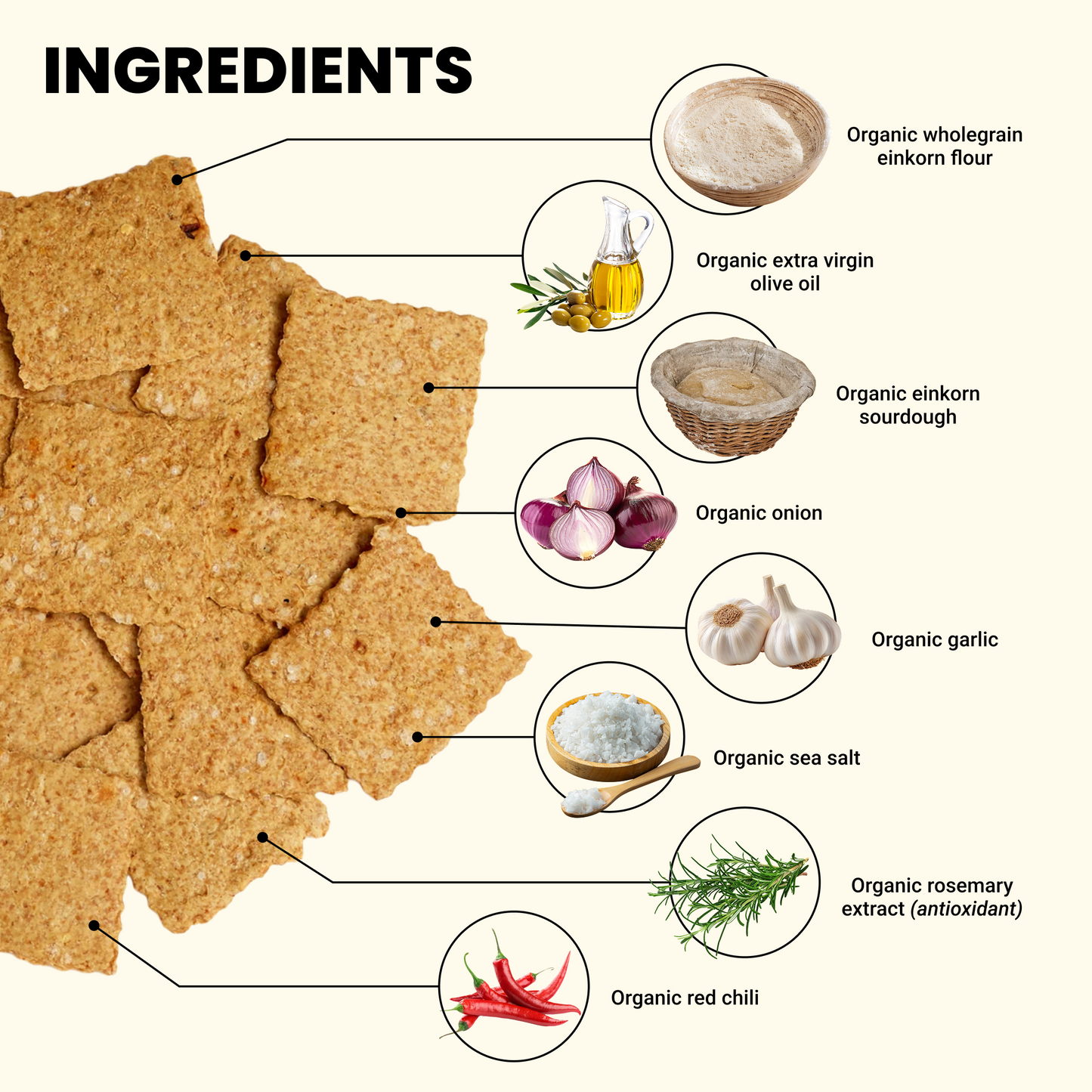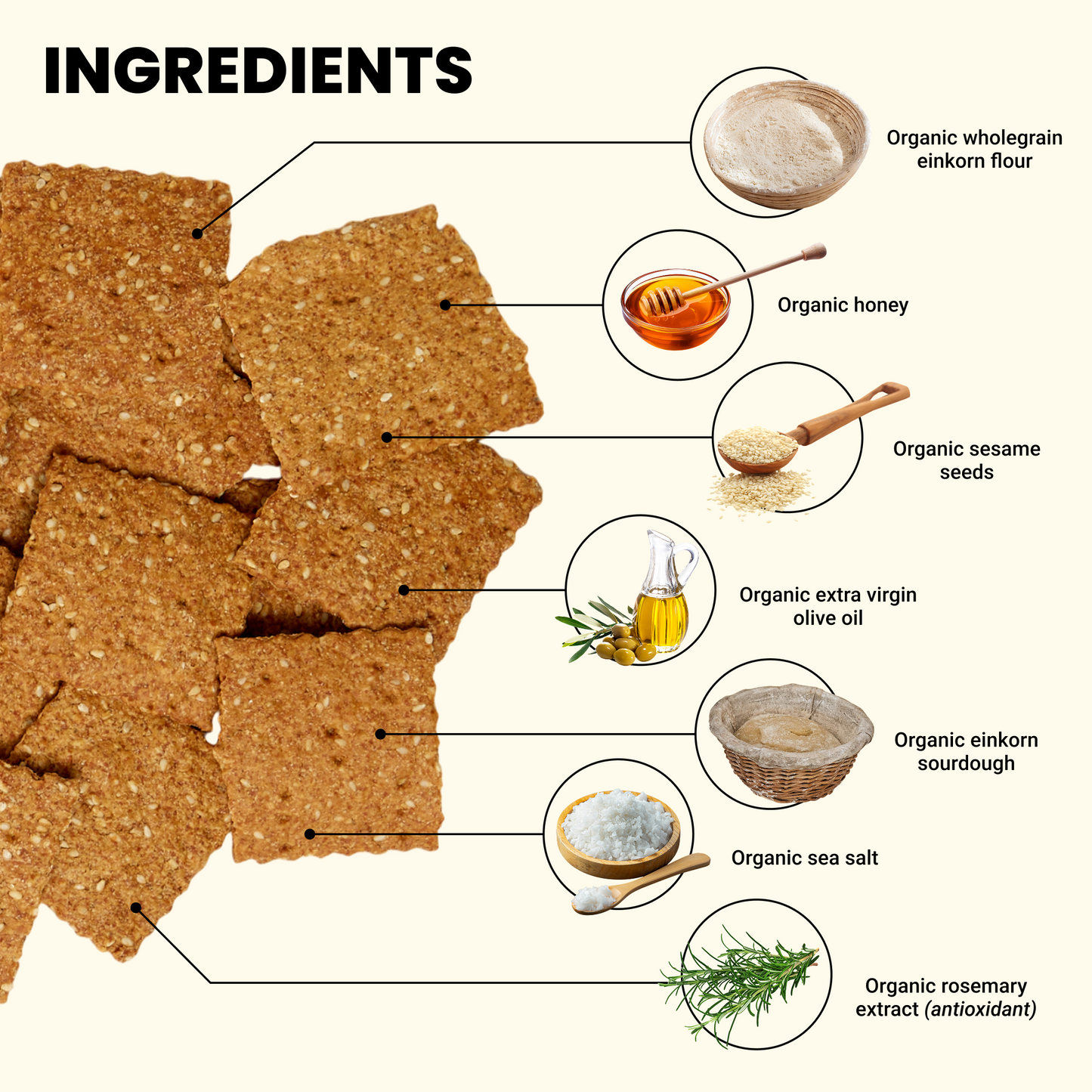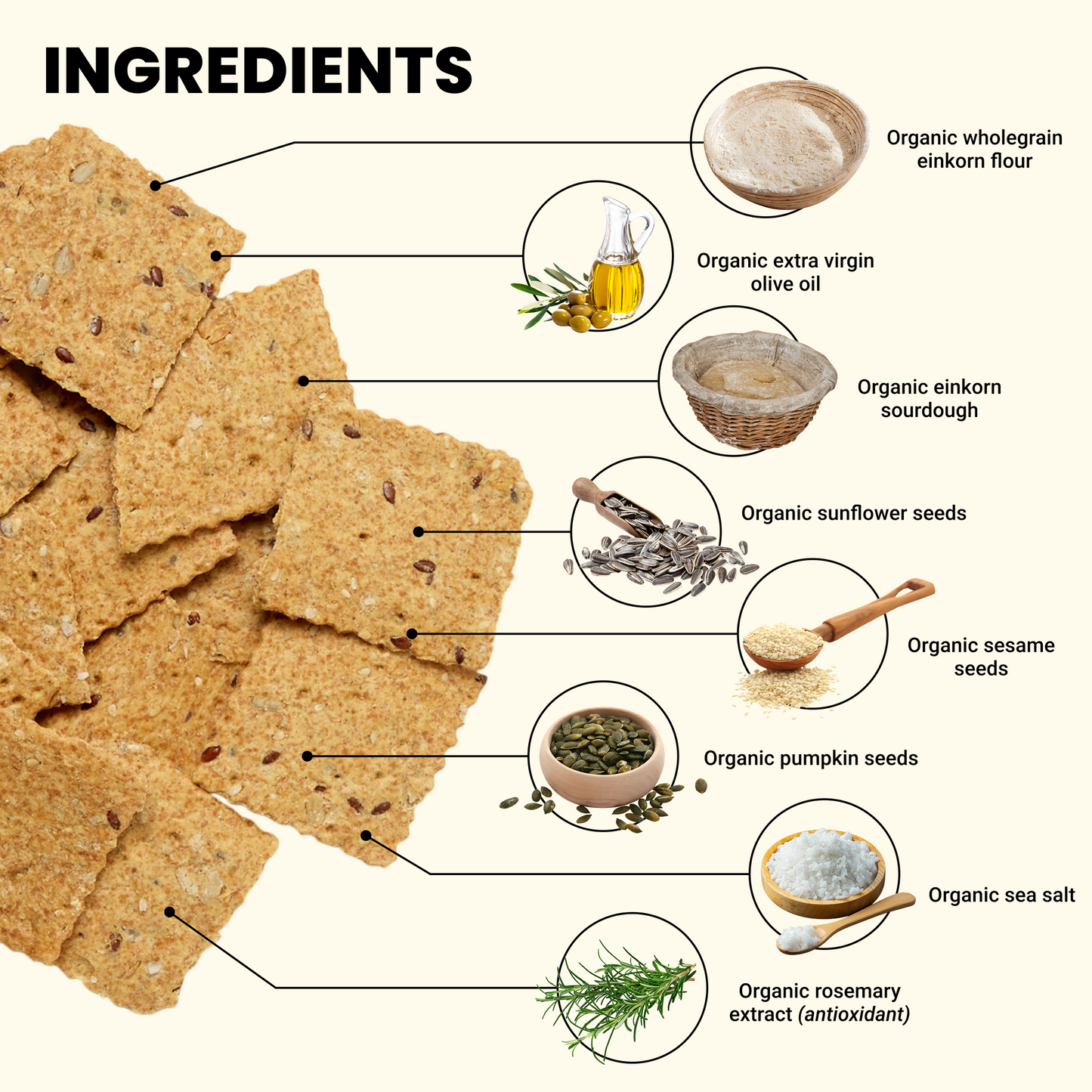
For years, gluten has taken the fall for digestive issues. Bloated? Gluten. Brain fog? Gluten. Afternoon slump after a sandwich? Definitely gluten. The gluten-free industry has exploded because people feel better when they avoid wheat—but what if we’ve been blaming the wrong thing?
A 2023 scientific review from researchers at the University of British Columbia suggests just that: glyphosate, a key ingredient in glyphosate based herbicides, not gluten, may be the real reason so many people struggle with wheat. And at Revival Einkorn, where we grow the world’s purest, non-hybridized einkorn wheat, we think this research deserves your attention.
What is Glyphosate?
Glyphosate is a broad-spectrum systemic herbicide and crop desiccant, widely recognized as one of the most widely used herbicides in agriculture. This organophosphorus compound, specifically a phosphonate, works by inhibiting a crucial plant enzyme known as 5-enolpyruvylshikimate-3-phosphate synthase (EPSP). Essentially, glyphosate is absorbed through the foliage of plants and, to a lesser extent, through their roots. It’s particularly effective on actively growing plants, making it a go-to post-emergence herbicide for weed control. However, it’s not effective as a pre-emergence herbicide, meaning it won’t prevent weeds from sprouting in the first place.
The Problem Isn’t the Wheat—It’s What’s Been Done to It and Its Impact on Human Health
Glyphosate—the active ingredient in Roundup—is the most widely used herbicide in the world. While genetically modified wheat isn’t commercially grown in North America, modern wheat has been selectively bred and hybridized over time, leading to higher gluten content and structural changes.
Glyphosate isn’t applied to all wheat, but some conventional farmers use it as a pre-harvest drying agent (desiccant) to speed up harvest, especially in wetter climates. This practice, more common in Canada and parts of the U.S., means some wheat is sprayed with a chemical designed to kill weeds, resulting in pesticide residues that linger in the wheat.
And here’s the problem: glyphosate doesn’t just disappear. It sticks around. It lingers in the wheat, in the flour, in the pasta and crackers you eat. And over time, it accumulates in the body.
Glyphosate in Food
Glyphosate residues can be found in a variety of food products, from fruits and vegetables to cereals and other staples. While this might sound alarming, regulatory bodies like the Environmental Protection Agency (EPA) and the European Food Safety Authority (EFSA) have set strict tolerances on how much pesticide residue can remain on food and feed products. These limits are designed to ensure that the levels of glyphosate residues in food are safe for human consumption. The EFSA has even concluded that glyphosate is unlikely to be genotoxic or pose a carcinogenic threat to humans, aligning with the EPA’s stance on its safety at regulated levels.
How Glyphosate Residues Might Impact Gut Health
Glyphosate was once marketed as safe for humans because it targets the shikimate pathway—a biological system used by plants and bacteria, but not human cells. Sounds harmless, right? Not so fast.
While human cells don’t have this pathway, many beneficial gut bacteria do—meaning glyphosate could disrupt microbial balance. Some studies suggest glyphosate exposure contributes to dysbiosis—an imbalance in gut bacteria that can affect digestion and immune function.
One emerging area of research explores whether glyphosate interferes with Rothia, a type of gut bacteria involved in breaking down gluten. If glyphosate disrupts these bacteria, it could make gluten harder to digest—potentially fueling wheat-related digestive discomfort. However, more research is needed.
While regulatory agencies still classify glyphosate as safe at typical dietary levels, ongoing studies continue to explore its long-term impact on gut health. The EPA's Endocrine Disruptor Screening Program is part of the ongoing evaluation of glyphosate's potential health impacts, including its effects on gut health.
Long-Term Exposure to Glyphosate
When it comes to long-term exposure, regulatory authorities like the EPA and EFSA have conducted extensive evaluations. Their findings suggest that glyphosate is not likely to be carcinogenic and does not pose a risk as a developmental or reproductive toxin. However, some studies have raised concerns about potential health effects, such as endocrine disruption. Organizations like The Detox Project have been vocal about these potential risks, advocating for more stringent evaluations and regulations. While the debate continues, it’s clear that more research is needed to fully understand the long-term health implications of glyphosate exposure.
Beyond Digestion—Could One of the Most Widely Used Herbicides Affect Overall Health?
The effects of glyphosate exposure may extend beyond gut health. Some researchers are questioning whether long-term exposure could contribute to chronic conditions. While science is still evolving, here’s what we know so far:
- Celiac disease & IBS: Some scientists hypothesize glyphosate may contribute to gut disorders by altering microbiome balance, though no direct causal link has been established.
- Mental health (anxiety & depression): Gut bacteria influence brain health, and researchers are exploring whether glyphosate-induced microbiome changes could impact mood. Early animal studies suggest a connection, but human research is still developing.
- Obesity & metabolic disorders: Some studies suggest glyphosate may alter gut bacteria in ways that affect metabolism, but human data remains inconclusive.
- Inflammatory Bowel Disease (IBD): Glyphosate exposure may contribute to gut imbalances seen in IBD, but multiple factors—including genetics—play a role.
While regulatory agencies maintain that glyphosate is safe at current levels, some studies have raised concerns about its classification as a potential human carcinogen. As new research emerges, many experts believe it’s worth re-evaluating what “safe” really means.
Glyphosate Residue and the Environment
Glyphosate residues can linger in the environment for several months, traveling through soil, water, and even air. The Environmental Protection Agency (EPA) has found that glyphosate is unlikely to contaminate groundwater due to its strong binding to soil particles. However, its presence can indirectly affect fish and wildlife by altering their habitats. The European Chemicals Agency (ECHA) has classified glyphosate as causing serious eye damage and being toxic to aquatic life, highlighting the need for careful management of its use to protect environmental health.
The Detox Project
The Detox Project is a non-profit organization dedicated to testing and certifying products for glyphosate residues. Using a limit of detection (LOD) of 0.01 ppm, which is the internationally accepted standard for pesticide analysis, The Detox Project ensures that products bearing their certification mark are free from glyphosate residue. This certification is invaluable for ingredient suppliers and food and supplement manufacturers who want to demonstrate their commitment to offering glyphosate residue free products. The certification mark can be prominently displayed on product labels, signage, and marketing materials, helping consumers make informed choices about the products they purchase.
Revival Einkorn: Certified Glyphosate Residue Free
We don’t take this research lightly. At Revival Einkorn, we believe food should be real, clean, and nourishing. That’s why we’ve always been 100% glyphosate-free—and now, we have the certification to prove it.
Our einkorn pasta and crackers are officially certified glyphosate residue free by The Detox Project. That means you can trust our wheat is exactly as nature intended—no chemicals, no shortcuts, no compromises.
If you’ve been struggling with wheat intolerance, maybe it’s time to stop blindly blaming gluten and start looking at what’s been done to wheat. Einkorn is the original wheat—never hybridized, never sprayed with glyphosate, naturally easier to digest. It’s time to change the conversation.
The Takeaway: Try It for Yourself
Science takes time. We may not get a definitive ruling on glyphosate’s full impact for years. But you don’t have to wait. The best way to find out if glyphosate is affecting your health? Cut it out. Look for products that are certified glyphosate residue free to ensure you are making a safe choice for your health. Try switching to organic and glyphosate-free wheat and see how you feel.
Maybe the problem was never wheat. Maybe it was what’s been done to it.






